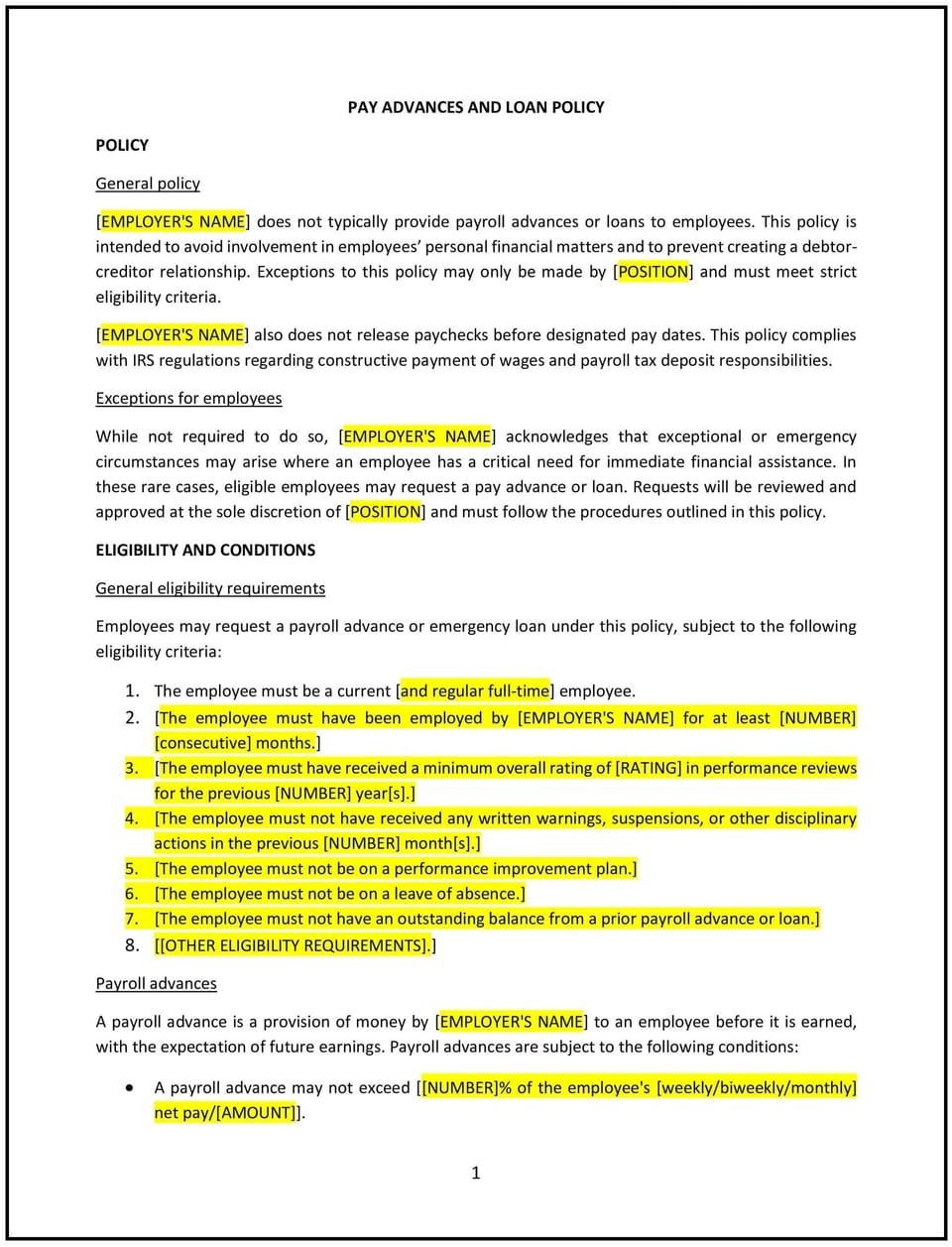Pay advances and loan policy (Florida): Free template

Pay advances and loan policy (Florida)
A pay advances and loan policy helps Florida businesses establish guidelines for providing financial assistance to employees in the form of advances or loans. This policy outlines procedures for requesting, approving, and managing financial assistance while ensuring fairness and operational efficiency. It is designed to promote employee well-being, reduce financial stress, and provide clear expectations for managing financial assistance in the workplace.
By implementing this policy, businesses in Florida can demonstrate their commitment to supporting employees during financial hardships, foster goodwill, and align with the state’s focus on fostering a supportive and responsible workplace.
How to use this pay advances and loan policy (Florida)
- Define eligible employees: Clearly specify which employees qualify for pay advances or loans, such as full-time or part-time staff facing financial difficulties.
- Establish request procedures: Outline how employees should notify the business of their need for a pay advance or loan, including whom to contact and how to document requests.
- Address approval criteria: Explain how businesses should evaluate requests based on factors such as financial need, repayment terms, and business impact.
- Specify repayment terms: Provide guidelines on how repayments will be handled, including deductions from future paychecks or other arrangements.
- Communicate the policy: Share the policy with employees during onboarding and through regular communications to ensure awareness and understanding.
- Monitor adherence: Regularly review how the policy is applied and address any concerns or discrepancies promptly.
- Update the policy: Periodically assess the policy to reflect changes in workplace dynamics, legal standards, or business needs.
Benefits of using this pay advances and loan policy (Florida)
This policy offers several advantages for Florida businesses:
- Promotes employee well-being: Financial assistance helps employees manage financial hardships and reduces stress.
- Reduces financial stress: Providing pay advances or loans demonstrates the business’s commitment to supporting employees during challenging times.
- Builds trust: A clear policy demonstrates the business’s commitment to fairness and employee well-being.
- Aligns with community values: Reflects Florida’s emphasis on supporting employees and fostering a responsible workplace.
- Enhances reputation: Demonstrates the business’s dedication to ethical practices and employee support.
- Improves retention: Offering financial assistance contributes to higher employee satisfaction and loyalty.
- Supports growth: A robust policy facilitates a more engaged and productive workforce.
Tips for using this pay advances and loan policy (Florida)
- Communicate clearly: Ensure employees understand the policy by providing written materials and discussing it during meetings or training sessions.
- Train managers: Educate supervisors on how to handle pay advance and loan requests fairly and consistently.
- Be transparent: Require employees to disclose financial needs and repayment plans to ensure transparency and fairness.
- Stay informed: Keep up with changes in employment laws, regulations, or best practices that may affect financial assistance policies.
- Encourage feedback: Solicit input from employees to identify areas for improvement and ensure the policy meets their needs.
- Review periodically: Assess the policy’s effectiveness and make updates as needed to reflect changes in workplace dynamics or business goals.
Q: Why should Florida businesses adopt a pay advances and loan policy?
A: Businesses should adopt this policy to promote employee well-being, reduce financial stress, and demonstrate their commitment to supporting employees during financial hardships.
Q: What types of financial assistance should businesses consider?
A: Businesses should consider offering pay advances or loans to employees facing financial difficulties, ensuring the assistance aligns with business needs and policies.
Q: How should businesses handle pay advance and loan requests?
A: Businesses should evaluate requests based on financial need, repayment capacity, and business impact, ensuring transparency and fairness in decision-making.
Q: Should businesses require documentation for financial assistance requests?
A: Businesses should request reasonable documentation, such as proof of financial hardship, to verify the need for assistance.
Q: How can businesses ensure fairness in handling financial assistance requests?
A: Businesses should apply the policy consistently across all employees, ensuring that decisions are based on objective criteria and documented evidence.
Q: What should businesses do if an employee fails to repay a loan?
A: Businesses should address repayment failures promptly by communicating with the employee, exploring alternative repayment plans, and taking corrective actions as necessary.
Q: How often should businesses review the policy?
A: Businesses should review the policy annually or whenever there are significant changes in workplace dynamics, legal standards, or business operations.
This article contains general legal information and does not contain legal advice. Cobrief is not a law firm or a substitute for an attorney or law firm. The law is complex and changes often. For legal advice, please ask a lawyer.


